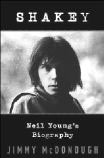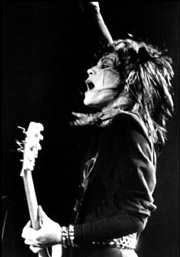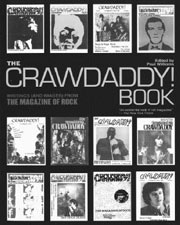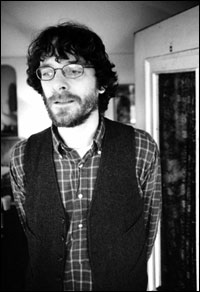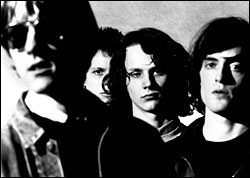SHAKEY: NEIL YOUNG’S BIOGRAPHY
by Jimmy McDonough (Random House, $29.95) UW campus, Kane Hall, Room 110, 634-3400; 7 p.m. Thurs., May 30
IF NEIL YOUNG had a dime for every writer who tried to unlock his elusive, brilliant, maddeningly contrary brain, he’d be a millionaire. Well, OK, he is a millionaire, and as it turns out, noted journalist (and Northwest resident) Jimmy McDonough actually got to hear the key twist. Mind you, the door never swung fully open, despite 50 hours of conversations with the man himself, interviews with several hundred Young associates, and eight years of research. But McDonough’s new 786-page bio, Shakey, is still the most tactile portrait of Young to date.
“My whole reason for doing this book,” says McDonough, “was I wanted a feeling of Neil Young to come across. Not necessarily do an autopsy, or open-heart surgery, or death by firing squad. I just wanted people to feel him.”
Predictably, Shakey covers a lot of familiar Young territory, including the early years in Canada; superstar tales of Buffalo Springfield and Crosby, Stills, Nash & Young; and, of course, the idiosyncratic solo career arc that, by the ’90s, had earned Young impeccable cultural cachet.
But McDonough, by dispensing with the critical essay format of other Young bio treatments and allowing some 300-odd voices to bring what is admittedly a serpentine narrative to life in all its ragged, oftentimes debauched glory, achieves his goal. By the end, you still might not understand what makes Young tick, but you definitely feel the man’s presence.
McDonough originally scored the gig on a whim. An unusual Young profile for the Village Voice in ’89 led to an invitation to pen liner notes for the musician’s long- delayed Archives project; Young, an unpredictable crank himself, dug McDonough’s two-fisted style enough to let the writer take things further.
Granted unprecedented access to the musician and his inner circle, McDonough accumulated a wealth of heretofore unchronicled data—just the electrifying (and terrifying) passages outlining the chaotic Tonight’s the Night period are alone worth the book’s $30 price tag. Family members, dope dealers, estranged musicians, ex-wives, the guys in Crazy Horse, etc., all weigh in, with late producer David Briggs, co-architect of some of Young’s greatest albums, offering some of the book’s heaviest and most unvarnished quotes. McDonough also includes Greek chorus-like commentary from fellow author/critic Richard Meltzer, who, typically, gets in some of the best lines. (Meltzer, on Y joining CSN: “Like Muddy Waters sitting in with the Rolling Stones.”)
McDonough’s no celebrity rim-jobber, though. Quick to berate Young face-to-face for perceived missteps and contradictions, he sometimes found himself dragged into his own narrative, such as the time in ’93 when, thwarting the plans of Young’s management, he convinced the singer not to turn in a track originally slated for the soundtrack of Wayne’s World 2. McDonough says he welcomes people criticizing his brand of participatory journalism: “Let’s face it, chaos surrounds the guy. Everything in this book is over the top, for better or for worse—there’s a lot of Neil’s DNA smeared all over it.”
IN 1998, upon completing his manuscript and turning it over to Young for review, McDonough was abruptly informed that the book deal was off. Eventually McDonough’s lawyers had to sue Young; the project was salvaged last year out of court.
“Neil’s people, and I don’t know where it emanated from, wanted to pull the plug on the book. Was I surprised? You know, David Briggs told me it would happen. If anybody reads the book, they’ll sense the complex nature of [Young] and how it would not be out of character for him to do what he did. I bear the guy no ill will. Sure, there were rocky patches. The upshot of all this—and I want to make this very clear—is, in the end, Neil let me publish the book I wrote.”
As Shakey effectively concludes in ’98, it seems appropriate to ask McDonough his opinion of Young’s output since then. Taking a dim view of his work the past four years, McDonough offers only intermittent praise for the recent Are You Passionate? album and reserves his main kudos for Young’s heartfelt reading of John Lennon’s “Imagine” at the America: A Tribute to Heroes broadcast (“A world-class performance on his part”).
In fact, says the author, with his decade-long odyssey over, he’s taking a break from listening to Young.
Confides McDonough with a dry chuckle, “I’m going to Neil Anonymous.”
